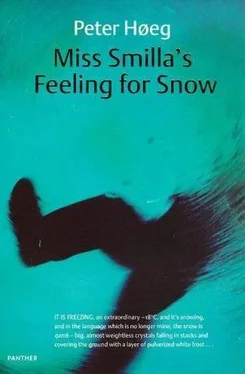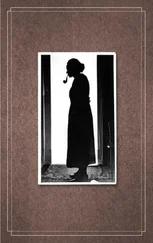Peter Høeg - Smilla's Sense of Snow aka Miss Smilla's Feeling for Snow
Здесь есть возможность читать онлайн «Peter Høeg - Smilla's Sense of Snow aka Miss Smilla's Feeling for Snow» весь текст электронной книги совершенно бесплатно (целиком полную версию без сокращений). В некоторых случаях можно слушать аудио, скачать через торрент в формате fb2 и присутствует краткое содержание. Жанр: Современная проза, на английском языке. Описание произведения, (предисловие) а так же отзывы посетителей доступны на портале библиотеки ЛибКат.
- Название:Smilla's Sense of Snow aka Miss Smilla's Feeling for Snow
- Автор:
- Жанр:
- Год:неизвестен
- ISBN:нет данных
- Рейтинг книги:3 / 5. Голосов: 1
-
Избранное:Добавить в избранное
- Отзывы:
-
Ваша оценка:
- 60
- 1
- 2
- 3
- 4
- 5
Smilla's Sense of Snow aka Miss Smilla's Feeling for Snow: краткое содержание, описание и аннотация
Предлагаем к чтению аннотацию, описание, краткое содержание или предисловие (зависит от того, что написал сам автор книги «Smilla's Sense of Snow aka Miss Smilla's Feeling for Snow»). Если вы не нашли необходимую информацию о книге — напишите в комментариях, мы постараемся отыскать её.
Smilla's Sense of Snow aka Miss Smilla's Feeling for Snow — читать онлайн бесплатно полную книгу (весь текст) целиком
Ниже представлен текст книги, разбитый по страницам. Система сохранения места последней прочитанной страницы, позволяет с удобством читать онлайн бесплатно книгу «Smilla's Sense of Snow aka Miss Smilla's Feeling for Snow», без необходимости каждый раз заново искать на чём Вы остановились. Поставьте закладку, и сможете в любой момент перейти на страницу, на которой закончили чтение.
Интервал:
Закладка:
This is Verlaine's domain. Even now, when there's not a soul in sight, his presence is palpable.
I lock the door behind me. My weapons have always been the small details that no one knows about. My identity, my intentions, Jakkelsen's passkey. They can't possibly know that I have it. They must think it was an accident, an oversight on their part, that I got into the quarterdeck last time. They were afraid that I was on to something. But they couldn't know anything about the key.
In the first room I let the beam of my flashlight play over tightly packed arid battened-down cans of red lead, primer paint, ship's lacquer, joint filler, special thinner, crates of face masks, epoxy tar, paintbrushes, and rollers. Everything is stacked up and clean and orderly. Verlaine's meticulousness.
The second door is the back entrance to a toilet-the one opposite the double shower room. The next leads to the metal shop, where Hansen polishes his knives with Viennese chalk.
The last room is the electrical shop. You could hide a small elephant in the labyrinth of cupboards, shelves, and crates, and it would take me an hour to find it. I don't have an hour. So I close the door and head below.
The door to the between decks is locked now. And bolted shut. Someone wanted to make sure that no one could get in this way. I turn on my light for only brief moments. I'm probably being overly cautious, since I'm in a windowless darkness, but my nerves can't take much more.
I stand still and listen. I have to force myself not to panic. I've never liked the dark. I've never understood the Danish penchant for wandering around at night. Taking a stroll in pitch darkness. Nightingale walks in the woods. Insisting on gazing at the stars. Nighttime orienteering.
You have to respect the dark. Night is the time when space simmers with evil and peril. You can call it superstition. You can call it fear of the dark. But it's ridiculous to pretend that the night is just like the day, simply without light. Night is the time to huddle together indoors. If you don't happen to be alone and have other obligations, that is.
Sounds are more tangible than objects in the dark. The sound of water around the propeller somewhere beneath my feet. The muted trilling of the ship's wake. The engine noise. The ventilation system. The rotation of the propeller shaft on its bearings. A little electric compressor, its location almost impossible to pinpoint. Like trying to figure out which neighbor has the noisy refrigerator in your apartment building.
There's a refrigerator here, too. I don't find it by the sound. I find it because the darkness makes me visualize my own sketch. I pace off the corridor. But I already know the results. Sheer nervousness prevented me from noticing it earlier. The corridor is six feet too short. According to Jakkelsen, somewhere behind the wall at the end of the room is the hydraulic rudder system. But that doesn't explain the missing six feet.
I shine my light on the wall. It has the same veneer as the other walls. That's why I didn't see it before. But it's been recently applied. The veneer has been nailed down. It's a rather makeshift hiding place, hastily rigged up. But I wouldn't be able to open it on my own. Even if I had the proper tools.
I open the nearest door.
The black cases are standing against the wall. They're labeled GRIMLOT MUSICAL INSTRUMENT FLIGHT CASES. I open the first one. It's rectangular and looks as if it might hold a medium-sized tweeter.
The manufacturer's guarantee under the two shiny blue tanks of enameled steel says: "Self-contained Underwater Breathing Apparatus." They're covered with a rubberized net to protect the paint from impacts.
I open another, smaller case. It contains what look like valves to screw onto the tanks. Bright and shiny. Nestled in custom-shaped foam. An oxygen gauge. But a type I've never seen before, which is supposed to be attached to the tanks instead of sitting directly on the mouthpiece.
In the next case there are pressure gauges and wrist compasses. A large suitcase with a handle contains goggles, three pairs of flippers, stainless-steel daggers in rubber sheaths, and two inflatable float collars to attach to the tanks.
In a duffel bag there are two hooded rubber suits with zippers at the wrists and ankles. Wetsuits made of neoprene. At least half an inch thick. Underneath are two Poseidon dry suits. And under them are gloves, socks, two thermal suits, safety lines, and six different kinds of battery-powered lamps, two of which are attached to a helmet.
There's a case that looks as if it might contain an electric bass, but it's somewhat longer and deeper. It's leaning against the bulkhead. Inside it is Jakkelsen.
It wasn't quite big enough for him, so they had to press his head down against his right shoulder and bend his legs up behind his thighs so that he's kneeling. His eyes are open. He still has my jacket over him.
I touch his face. He's still moist and warm. The body temperature of a large animal drops a few degrees per hour after it's been shot, if it's lying outdoors in the summer. The numbers are probably about the same for human beings. Jakkelsen is approaching room temperature.
I put my hand in his breast pocket. The syringe is gone. But there's something else in the pocket. I should have wondered about that before. Metal doesn't clink all by itself. It clinks against another piece of metal. Very cautiously, with my hand inside his pocket, I grab hold of a little triangle. It's growing out of his chest.
Rigor mortis spreads from the jaw muscles downward. The same way nervous tension does. He's stiff all the way to his navel. I can't turn him over, so I run my hand down along the inside of the case and up behind his back, inside his jacket. Sticking out between his shoulder blades there's a piece of metal, less than an inch long, flat and no thicker than a nail file. Or the blade of a cold chisel.
The blade was driven in between two ribs and then straight up. It looks as if it went through his heart. Then the handle was removed, but the blade was left in. To prevent bleeding.
On any other person the blade would not have exited through the chest. But Jakkelsen is fashionably slim.
It must have happened right before I reached him. Maybe even while I was on my way across the square.
In Greenland I never had any cavities; now I have twelve fillings. Every year I need another one. I refuse to have novocaine. I've developed a strategy for handling the pain. I breathe deeply from my abdomen, and right before the drill pierces the enamel into the dentine of the tooth, I think to myself that now something is happening to me that I have to accept. That's how I become an involved but not overwhelmed spectator to the pain.
I was present in the parliament, the Landsting, when the Siumut Party proposed that the planned withdrawal of American and Danish forces from Greenland should be preceded by the establishment of a Greenlandic military. But of course that's not what they called it. A decentralized coast guard, they said, initially manned by those Greenlanders who had served as constables in the navy during the past three years. And led by A-level officers who would be trained in Denmark.
I thought it was impossible; they'd never agree to it. It was voted down. "We are surprised by the results of the vote," said Julius Høeg, Siumut's foreign-policy spokesman, "considering that this parliament's committee on national security has recommended a coast guard and established a preliminary work group made up of representatives from the Danish Navy, the Greenland police, the Sirius Patrol, the Ice Service, and other professionals."
Other professionals. The most important information always comes at the end. As if in passing. In a side letter. In the margin.
The security personnel on the Greenland Star were Greenlanders. Only now that it's behind us do I remember this fact. We no longer notice things that have become commonplace. It has become common to see armed Greenlanders in uniform. Common for us to wage war.
Читать дальшеИнтервал:
Закладка:
Похожие книги на «Smilla's Sense of Snow aka Miss Smilla's Feeling for Snow»
Представляем Вашему вниманию похожие книги на «Smilla's Sense of Snow aka Miss Smilla's Feeling for Snow» списком для выбора. Мы отобрали схожую по названию и смыслу литературу в надежде предоставить читателям больше вариантов отыскать новые, интересные, ещё непрочитанные произведения.
Обсуждение, отзывы о книге «Smilla's Sense of Snow aka Miss Smilla's Feeling for Snow» и просто собственные мнения читателей. Оставьте ваши комментарии, напишите, что Вы думаете о произведении, его смысле или главных героях. Укажите что конкретно понравилось, а что нет, и почему Вы так считаете.




![Рута Шепетис - Ashes in the Snow [aka Between Shades of Gray]](/books/414915/ruta-shepetis-ashes-in-the-snow-aka-between-shades-thumb.webp)







